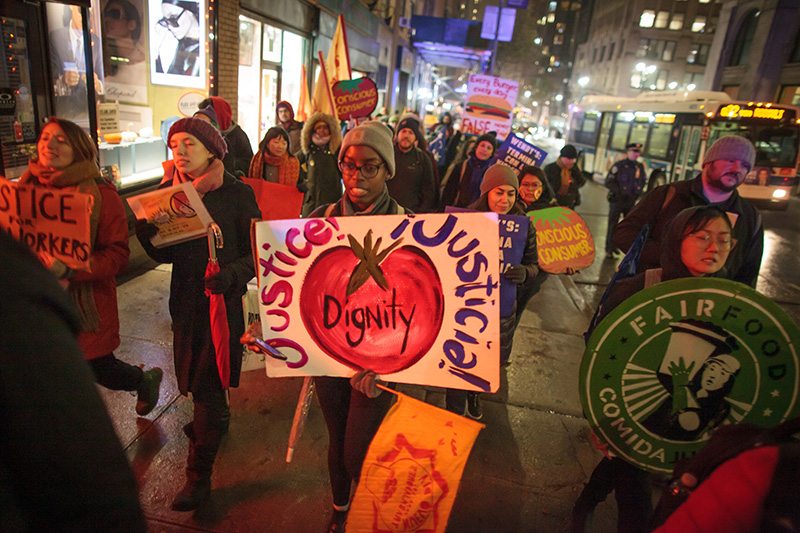
It’s time again for a media round-up!…
When stories on the CIW or the Fair Food Program slip through the cracks in the seemingly infinite reaches of the internet, this site will always be there to catch them and serve them up to you periodically in a media round-up. Today we have three stories to share with you on the groundbreaking work coming out of Immokalee, so without further ado, here is your very latest media round-up…
-
Our friends and longtime colleagues at Futures Without Violence recently published an extraordinary new resource for anyone and everyone looking to end sexual harassment and assault in the workplace, titled “The Everyday Activist Guide for Ending Workplace Sexual Harassment and Assault”, and the CIW’s Nely Rodriguez figures prominently among the activists highlighted in the report. Here’s a brief excerpt from the must-read new guide (which you can download here):

… What they achieved
Thanks to market consequences and the Fair Food Program’s zero tolerance for sexual violence, reported cases of rape and sexual assault have been virtually eliminated from participating farms, and sexual harassment has plummeted. The Fair Food Program has also combated economic insecurity through the commitment by buyers to pay an extra “penny per pound” of tomatoes, which has resulted in over $30 million in wage bonuses to workers since the Program’s inception.
How they did it
The Coalition of Immokalee Workers created the Fair Food Program which rallied consumers to demand fruits and vegetables that have been grown on farms that provide safe and humane working conditions for farmworkers.
As more buyers signed on to the program and agreed to only buy from growers who would implement a new, worker-driven Code of Conduct and pay “a penny more per pound” for crops such as tomatoes, strawberries, and peppers, the program was able to combat economic insecurity and enact structures and systems to ensure greater worker protections.
The Fair Food Code of Conduct mandates protections against sexual assault and harassment, wage theft, unsafe working conditions, and other abuses.
Drafted by the workers themselves, the program requires distribution of worker-authored written and multimedia “Know Your Rights” materials at the point of hire, and peer-to-peer education throughout the season. Trainings are conducted in workers’ native languages.
Auditors with an independent third-party body conduct regular in-depth audits and run a 24-hour complaint resolution mechanism, which has resolved nearly 2,500 complaints since the beginning of the program… (read more)
-
One of the Fair Food Program’s leading partners among Participating Buyers is Compass Group, the largest contract foodservice company in the world. Compass recently published its 2019 Corporate Social Responsibility Report, and a significant expansion of its commitment to the Fair Food Program is listed among its proudest accomplishments over the past year. Here’s an excerpt:

… We created a culture that embraces corporate transparency as a crucial aspect of our success. A couple highlights include:
- Doubling the purchases within our partnership with the Coalition of Immokalee Workers (CIW) to 8.7 million pounds, which equates to the weight of more than 130 Humpback Whales!
- Removing 55 million straws company-wide, which equals the length of the United States coast-to- coast and back.
- Reducing our emissions by nearly 8000 Metric Tons, which equates to planting more nearly 133,000 trees.
“All of these accomplishments reflect our beliefs and our commitment to a more sustainable future. We are proud to share these stories and we look forward to building on what we’ve done so that together we can improve both people and planet.” – Susie Weintraub, Envision Group CEO
-
And finally, from the wellness blog mindbodygreen comes our last update of the day, from a blog post titled “5 Ways To Help Fix The Food System Every Time You Grocery Shop“. Here’s an excerpt:
… Food is also a social injustice issue. Many of the over 20 million food and farmworkers in the U.S. are people of color who struggle to make a living wage while performing dangerous work. They’re subject to harsh working and living conditions and exposed to toxic agricultural chemicals but lack adequate health care. In extreme cases, they can face modern forms of slavery, sexual harassment, and abuse.
While these are complex issues that won’t be solved overnight, I believe that a healthier, cleaner, smarter food system starts at the end of your fork. All you have to do is make a few simple conscious decisions about what you put on it…
…4. Look for a few specific labels to support healthy farmworkers.
Regenerative farms are a step ahead when it comes to worker safety, oftentimes with family or owners working alongside employees and teaching them how to run their own successful farms in the process. Food retailers like Whole Foods Market and Trader Joe’s have agreed to sign the Fair Food Program, which pressures growers to adhere to basic tenets for workers’ rights including providing minimum living wage, no sexual or verbal abuse, freedom from unsafe working conditions, and access to restrooms and water with adequate break time. Ask your local grocery store if they’re willing to commit to the Fair Food Program.
That’s it for now. Check back soon for more from the organizing front in NYC as next month’s big “Follow the Money” march rapidly approaches!
